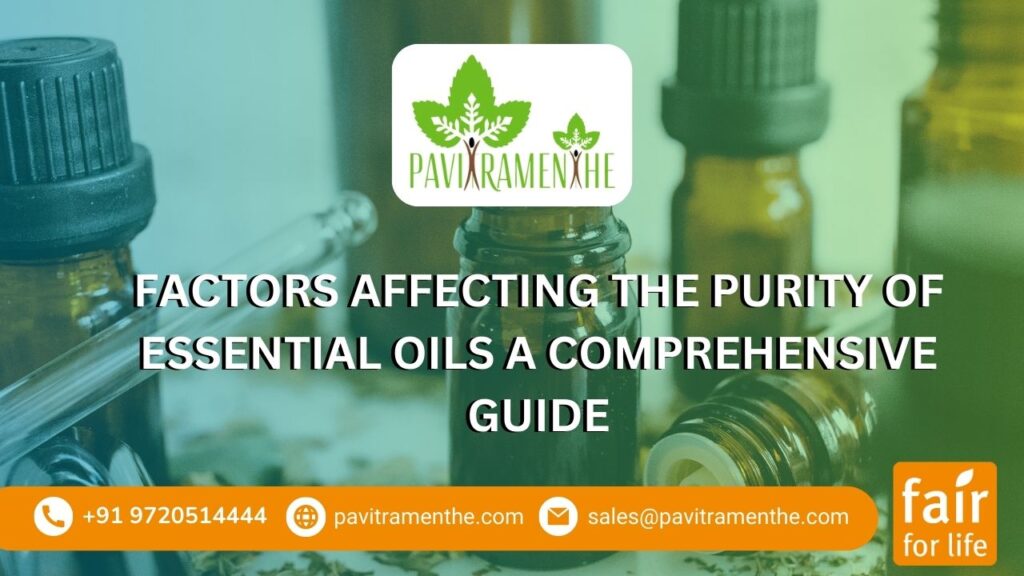Essential oils have gained immense popularity in recent years for their aromatic and therapeutic properties. Derived from various plant parts, these oils are known for their purity and potency. However, maintaining the purity of essential oils is essential to ensure their efficacy and safety. In this comprehensive guide, we will explore the key factors that affect the purity of essential oils and how to ensure you are getting high-quality products.
Source and Quality of Plants
The purity of essential oils heavily depends on the source and quality of the plants from which they are derived. Organic cultivation without the use of synthetic pesticides or fertilizers is crucial to obtaining pure essential oils. Plants grown in polluted environments or exposed to harmful chemicals may have contaminants that can find their way into the final product.
Extraction Method:Various methods are used to extract essential oils from plant material, such as steam distillation, cold pressing, and solvent extraction. Each method affects the purity and potency of the oil. Steam distillation is the most common method and is preferred for producing high-quality oils. On the other hand, solvent extraction may leave behind traces of the chemicals used during the process, compromising purity.
Adulteration: Adulteration is a significant concern in the essential oil industry. Some unscrupulous manufacturers may dilute pure oils with synthetic additives or lower-grade oils to increase profits. This compromises the purity and therapeutic benefits of the oil. Look for suppliers that provide third-party testing or batch-specific GC/MS reports to ensure authenticity.The storage conditions of essential oils also play a critical role in maintaining their purity. Essential oils are sensitive to light, heat, and oxygen, which can lead to degradation and loss of potency. Always store oils in dark glass bottles away from direct sunlight and in a cool, dry place.
Also Read: Herbal skin tonners in India
Extraction Method:Various methods are used to extract essential oils from plant material, such as steam distillation, cold pressing, and solvent extraction. Each method affects the purity and potency of the oil. Steam distillation is the most common method and is preferred for producing high-quality oils. On the other hand, solvent extraction may leave behind traces of the chemicals used during the process, compromising purity:
Storage Conditions:The storage conditions of essential oils also play a critical role in maintaining their purity. Essential oils are sensitive to light, heat, and oxygen, which can lead to degradation and loss of potency. Always store oils in dark glass bottles away from direct sunlight and in a cool, dry place.
Harvesting and Distillation Time
The time of harvesting: and distillation can impact the chemical composition and purity of essential oils. Some plants produce essential oils at specific stages of growth or during certain times of the day. Harvesting plants at the right time and distilling them promptly after harvesting ensures the highest purity and potency of the oils.
Geographic Origin:The geographic origin of plants can significantly affect the purity of essential oils. Environmental factors such as soil quality, climate, and altitude can influence the chemical composition of the plant, leading to variations in the essential oil’s properties. Certain regions are renowned for producing premium-quality oils due to their favorable growing conditions.
Chemical Testing:To verify the purity of essential oils, chemical testing methods like Gas Chromatography-Mass Spectrometry (GC/MS) are employed. These tests analyze the chemical constituents of the oil and can detect any contaminants or adulterants. Reliable suppliers should provide these test results to ensure the purity and authenticity of their essential oils.
Price and Quality: Remember high-quality essential oils require a considerable amount of plant material and a precise extraction process, making them more expensive. If an essential oil is significantly cheaper than others on the market, it may indicate lower quality and potential adulteration. Invest in reputable brands that prioritize purity and quality.Maintaining the purity of essential oils is crucial for ensuring their efficacy and safety. Factors such as the source and quality of plants, extraction methods, adulteration, storage conditions, harvesting and distillation time, geographic origin, and chemical testing all impact the overall purity of essential oils. By choosing reputable suppliers, understanding proper storage, and demanding third-party test reports, you can confidently select high-quality essential oils to fully experience their numerous benefits.
Reputation of the Supplier:The reputation of the essential oil supplier is an important factor to consider when assessing the purity of the oils. Reputable suppliers prioritize quality and transparency, often providing detailed information about their sourcing, manufacturing processes, and testing procedures. Look for customer reviews and testimonials to gauge the satisfaction of previous buyers and their experiences with the products.
Knowledge and Expertise:Essential oil suppliers who have extensive knowledge and expertise in the field are more likely to understand the complexities of maintaining purity. They can offer valuable insights into the cultivation, extraction, and testing processes. Suppliers who are committed to education and spreading awareness about essential oils tend to be more invested in providing pure and authentic products.
Packaging and Labeling:Proper packaging and labeling of essential oils can provide valuable information about the product’s purity and authenticity. Look for clear and detailed labels that include the botanical name of the plant, country of origin, extraction method, and any certifications (e.g., organic, non-GMO). Essential oils packaged in dark glass bottles with a secure cap also help preserve their purity.


LUser Recommendations and Certifications
Endorsements or certifications: from recognized organizations or experts can offer further reassurance about the purity of essential oils. Look for certifications like Certified Organic, Non-GMO, or ISO 9001, which indicate compliance with specific standards. User recommendations from professionals such as aromatherapists or holistic practitioners can also guide you towards high-quality products.
Responsiveness to Customer Inquiries:A responsive and helpful customer support team can be an indicator of a reputable essential oil supplier. Suppliers who are willing to address customer inquiries and provide additional information about their products demonstrate a commitment to transparency and customer satisfaction. If you have any doubts about the purity of an essential oil, do not hesitate to reach out to the supplier for clarification.
Conclusion:Ensuring the purity of essential oils is essential to maximize their therapeutic benefits and avoid potential adverse effects. By considering the source and quality of plants, extraction methods, potential adulteration, storage conditions, harvesting and distillation time, geographic origin, chemical testing, price, supplier reputation, knowledge, packaging, certifications, and customer support, you can confidently select high-quality essential oils.Remember to do your research and buy from trusted suppliers who prioritize purity, transparency, and customer satisfaction. By incorporating pure essential oils into your aromatherapy, skincare, or wellness routines, you can harness their natural goodness for a more enriching and holistic experience.

